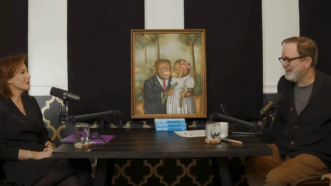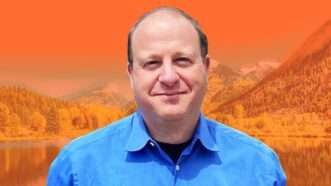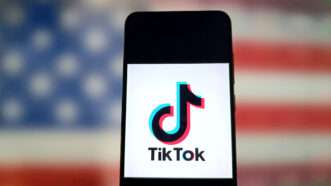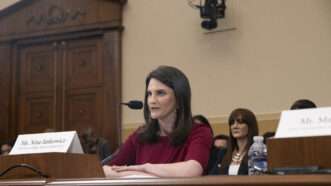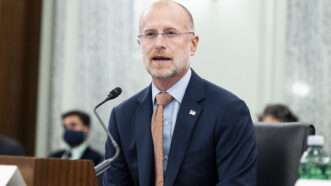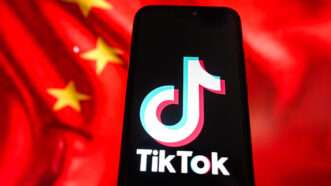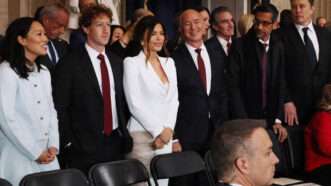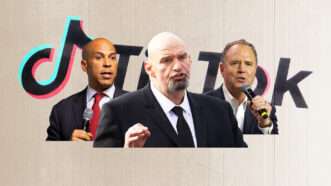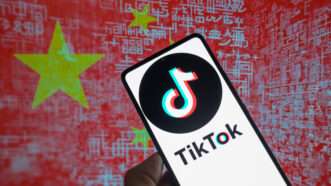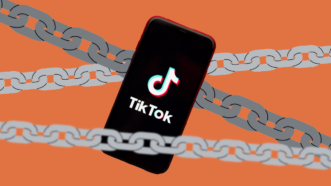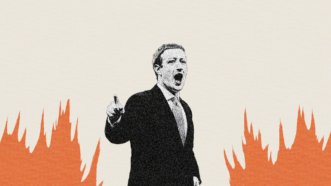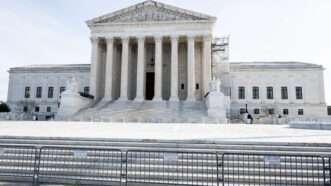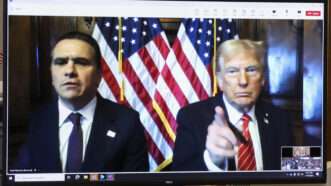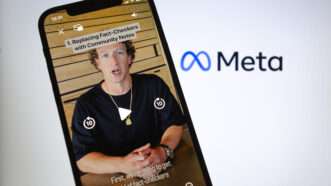Social Media
A Giant Pile of Money Won't Fix Democrats' Joe Rogan Problem
If he's chosen, he ain't Rogan.
Supreme Court Orders Maine Legislator Censured for Social Media Post Must Get Voting Rights Back
On Monday, the court granted an emergency injunction allowing Rep. Laurel Libby to resume voting and speaking after she was censured for a post criticizing trans women in women's sports.
The FTC's Probe Into 'Potentially Illegal' Content Moderation Is a Blatant Assault on the First Amendment
In the name of "restoring freedom of speech," FTC Chairman Andrew Ferguson wants to override the editorial judgments of social media platforms.
Maine Legislator Barred From Voting Over Social Media Post
Earlier this year, state Rep. Laurel Libby made a post criticizing trans women in women's sports. Her refusal to apologize has cost Libby her right to speak on the House floor and vote on legislation.
Fewer Than 3 Friends
Plus: Growth forecasts slashed, Pravda time, fentanyl seizures, and more...
The TAKE IT DOWN Act's Good Intentions Don't Make Up for Its Bad Policy
Congress just approved a new online censorship scheme under the auspices of thwarting revenge porn and AI-generated "nonconsensual intimate visual depictions."
Stephanie Ruhle Doesn't Know There's Fact-Checking on X
Live by your own rule, Ruhle!
Trump's Actions Contradict His Avowed Commitment to First Amendment Rights
The president has launched a multifaceted crusade against speech that offends him.
Missouri 13-Year-Old Suspended for Making a Rifle Out of Dr. Pepper Cans
The boy and his mother are now suing the school district and its officials to protect students' right to free expression.
Fewer People Support Censoring False Information Online
Support for suppressing "violent content" has also dropped.
Marco Rubio Brags About Defending Freedom of Speech While Eagerly Undermining It
The secretary of state, who aims to "liberate American speech," nevertheless wants to deport U.S. residents for expressing opinions that offend him.
The Trump Administration Wages War on Meta
Mark Zuckerberg's donations haven't stopped the Federal Trade Commission from going after his company.
Does Tween Tech Study Prove Jonathan Haidt Right?
Nope, but it does show how complicated the issue is.
BBC Grills Member of Parliament for Not Watching Enough TV
Leader of the Opposition Kemi Badenoch said she doesn’t have to watch Adolescence to understand the show’s themes.
'Libertarian' Gov. Jared Polis Signs 'Restrictive' Gun Law and Booze Ban
Is the small-government Democrat beefing up state power?
Rand Paul on China, Free Speech, and Banning TikTok
"I said now that they're banning it, I want to join, just because they're telling me I can't," the Kentucky senator tells Reason.
Study: Kids With Smartphones Are Less Depressed, Anxious, Bullied Than Peers Without Them
A large new study finds smartphone ownership positively correlated with multiple measures of well being in 11- to 13-year-old kids.
Can Trump Broker a TikTok Sale Before the April 5 Deadline?
The president seems optimistic. It's not clear why.
Nina Jankowicz's Defense of Government Censors Is Based on Misinformation
"Everything looks like a conspiracy when you don't know how anything works," said Jankowicz.
Don't Count on Quitting Social Media To Make Your Life Better
A new meta-analysis finds “no significant effects of social media abstinence interventions on positive affect, negative affect, or life satisfaction.”
The Truth About Brazil's Rumble Ban
Justice Alexandre de Moraes has shut down Rumble in Brazil, using the same dubious legal arguments that led to the blocking of X and Telegram.
FCC Chair Brendan Carr Wants More Control Over Social Media
Carr advocates greater control over social media by federal regulators, despite a reputation for supporting free speech.
The FTC Has No Business Trying To Make Sure Social Media Are 'Fair'
Chairman Andrew Ferguson’s assault on "Big Tech censorship" aims to override editorial decisions protected by the First Amendment.
How the FCC's 'Warrior for Free Speech' Became Our Censor in Chief
Brendan Carr has a clear record of threatening to suppress constitutionally protected speech.
No, Elon: It Isn't Illegal To Boycott X
Elon Musk sues seven more companies for pulling advertising from his platform.
Trump's Orders Feature Nonexistent Emergencies, Illegal Power Grabs, and Blatant Inconsistencies
But at least he restored respect for a tariff-loving predecessor by renaming a mountain.
Rand Paul: Banning TikTok Is 'Group Hysteria'
"Every day I confront a bill that wants to ban another Chinese company," the Kentucky senator tells Reason.
TikTok or Not, Americans Still Have a Right To Receive Communist Propaganda
A unanimous Supreme Court decision established as much in 1965.
The Tech Bros Love Trump Because the Democrats Pushed Them Away
What Elizabeth Warren has achieved.
TikTok Is Back Online as Trump Proposes Nationalizing It
While pledging to postpone the ban by executive order, the incoming president said the government should have a 50-percent ownership stake in the app.
Hours After Going Dark, TikTok Is Back
The popular video app restored service in the U.S. after President-elect Donald Trump promised to postpone a federal ban.
These Lawmakers Actively Use TikTok Even After Voting To Ban It
With just hours to go before it is set to shut down, many senators and representatives are still posting on the app they claim is too dangerous for the rest of us to use.
SCOTUS Rules in Favor of TikTok Ban as Some Supporters Realize It's a Bad Idea
"I cannot profess the kind of certainty I would like to have about the arguments and record before us," writes Justice Gorsuch.
So…Is TikTok Really Getting Banned?
The Supreme Court appears poised to uphold a ban on the app, but many creators aren't so sure.
Yes, Mark Zuckerberg, You Can Shout 'Fire' in a Crowded Theater
Anyone discussing free speech should at least try to get this right.
TikTok Took a Beating at the Supreme Court
Justice Neil Gorsuch criticized "the government's attempt to lodge secret evidence in this case." Still, things look grim for the app.
Trump's Latest Defeat Is One of Many Decisions That Suggest SCOTUS Won't Rubber-Stamp His Agenda
Despite some notable wins, the president-elect's overall track record shows he cannot count on a conservative Supreme Court to side with him.
Facebook's New Free Speech Policy Shows Business Getting Back to Business
It’s the latest company to step back from dangerous alliances with political factions.
An Urgent Meeting of the Fact-Check Legion of Doom
Mark Zuckerberg has had it with these people.











